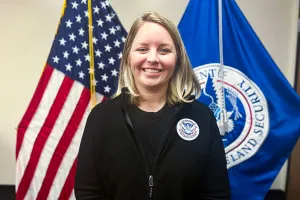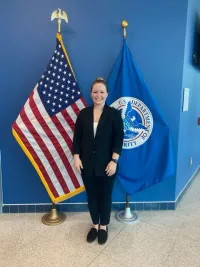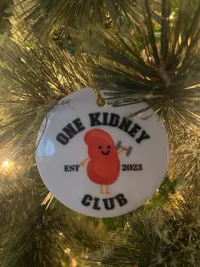 Each year there are more than 100,000 people in the U.S. waiting for a kidney transplant. (Photo courtesy of Lindsay Umphrey)
Each year there are more than 100,000 people in the U.S. waiting for a kidney transplant. (Photo courtesy of Lindsay Umphrey)
Detroit Metropolitan Wayne County Airport (DTW) Transportation Security Inspector (TSI) Lindsay Umphrey’s life drastically changed after her cousin’s battle with kidney disease led to a life-saving donor swap between two families.
Each year there are more than 100,000 people in the U.S. waiting for a kidney transplant. Her cousin was placed on a waiting list to receive a kidney from a deceased donor after the disease progressed to the point of needing dialysis. The average wait time for a deceased donor is three to five years, with different factors considered for each person on the list.
Umphrey, a mother of two young children, was worried for her cousin but rationalized that he was young and appeared healthy.
“Donation was not on my mind at the time, I truly believed he would receive a kidney through the waitlist and all would be well,” Umphrey said.
But two years passed without a match being found. Umphrey’s cousin and his family moved back to Michigan, and with this relocation, Umphrey began spending more time with them. She realized how strenuous dialysis was, not only on him, but on his wife and daughter. Every day, for 12 hours, he underwent treatment.
Umphrey felt a strong pull to see if she was a match, and in the summer of 2022, she underwent the first round of donor testing, which included bloodwork, an EKG, and CT scan, as well as a meeting with a social worker. That meeting allowed her to consider the many potential feelings that could arise during the donor process.
“I found the meeting to be very thought provoking,” Umphrey said. “This was a personal choice for me, and an individual choice for everyone who chooses to be involved at this point and throughout the donation process.”
Umphrey was most surprised with peoples’ strong opinions, both good and bad, about a person’s choice to be a donor.
A week following her testing, doctors relayed she needed to make positive health changes before she would be considered an ideal candidate.
“The initial rejection and information were hard for me to hear,” she said.
Instead of letting this be the end of her donor journey, Umphrey spent the next 6 months becoming healthier, following the doctors’ advice. Throughout those months, donation was constantly on her mind, and she knew she was making the right choice.
Umphrey returned to the University of Michigan a healthier candidate. She passed the health tests with flying colors but was hit with more devastating news – she was not a direct match to her cousin.
However, the University of Michigan explained the Kidney Paired Donation (KPD) program, an option for patients waiting for a kidney transplant who have a willing living donor, but tests reveal that the kidney would not be a good medical match. The program connects two or more pairs of living donors to swap and make a compatible match.
Umphrey knew this was her cousin’s best chance at quickly receiving a kidney and was willing to participate.
“I didn’t know how to approach my cousin and his family with the opportunity of a paired donation,” said Umphrey. “But I hoped after I explained my willingness to participate and asked my cousin his thoughts, he would agree.
“We come from a big, involved and loving family. Immediately, the whole family was on board in supporting both my cousin and I throughout the process. Some offered help with our young kids, others offered to make meals, and everyone offered cards and well wishes.”
Overwhelmed with emotion, Umphrey’s cousin agreed to the program.
With the decision made to move forward with surgery, Umphrey and her cousin were both entered into the Paired Kidney database, which pulls information from multiple hospitals to find the perfect kidney match for each candidate. The database worked to find a recipient for Umphrey’s kidney, as well as another person who was willing to donate a kidney that matched to her cousin.
The wait for a match process could be as quick as one day or as long as a year.
“Once we were entered into the database, the wait felt like forever when in reality it was rather quick,” said Umphrey.
In October 2023, she received the call that a potential match was found. Two weeks later, Umphrey and her cousin were told the good news that a cross match was confirmed, and surgery was scheduled.
On November 29, 2023, Umphrey reported for surgery and donated her left kidney to a complete stranger.
“I felt calm and certain about the whole process,” she said. “I was able to change the lives of two people, along with the other donor, with very minimal impact to myself.”
Later that day, her cousin received his new kidney. All four surgeries were flawlessly executed.
Umphrey was in the hospital for about 30 hours in total. Her cousin had a similar experience and was expected to be in the hospital for about 5 days but went home after two. He immediately felt the improvement and has continued to get better.
“The experience as a whole has been amazing,” Umphrey said. “I met so many people whose lives are impacted by kidney disease. I learned so much about dialysis and the increasingly large number of people on the waiting list to receive a deceased kidney donation.”
Moving forward, Umphrey continues to be an advocate for organ donation education.
“It is a big decision that is not for everyone,” she said. “The more education there is means the more myths can be debunked and more people will potentially consider being a donor, if the opportunity arises.”
Umphrey has been with TSA for 10 years. She started her career as a TSO at Gerald R. Ford International Airport, also in Michigan, and has been working at DTW since 2015.
“I am extremely grateful to TSA,” Umphrey said. “The fact that the agency allotted 30 days of paid leave following the surgery really allowed me to focus on my recovery and not worry about when I will be paid next. I don’t believe that organ donor leave is widely known about but it is a great benefit the agency offers.”
By Patricia Fantazian, Stakeholder Manager – Michigan, and Kimberlyn Pepe, Strategic Communications & Public Affairs


